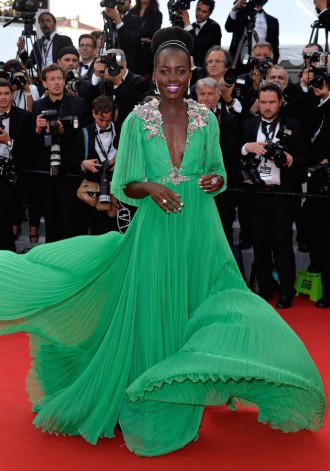‘Equity’ Movie Review: A Female-Driven Film That Melds Ambition, Betrayal And The Thrill of the Game

3/5
At an alumni event for working women in New York City, Naomi Bishop, played with calculating precision by Anna Gunn, bluntly declares that she likes making money. Seated next to her old college friend, justice department prosecutor Samantha Ryan, played by Alysia Reiner, she acknowledges the negative associations tied to the word money, especially when used amongst women. In her declaration, she sets up the underlying premise of the 2016 Sundance and Tribeca Film Festival-screened movie, one that was directed, written, produced and financed by women: in a financial world normally dictated and overly-represented by men, they are equally ambitious, in control, and are unabashedly in a race to the top of the financial food chain.
‘Equity’ Movie Review: Three Stars
Directed by Meera Menon, her second feature film project, Equity centers on Naomi Bishop, a top-level investment banker tasked with handling the public sale of new tech IPO (Initial Public Offering) Cachet. With a chip on her shoulder from a previously failed attempt at a public offering, she is passed up for a promotion to Global head, her supervisor chalking it up to a bad first impression; Bishop later dryly confesses to her lover and broker at the same firm, Michael (James Purefoy), that they simply, “didn’t like my dress.” The unbalanced dynamics between men and women in the workplace further unravels in the relationship between CEO of Cachet, Mark Zuckerberg photocopy Ed (Samuel Roukin) and Naomi’s earnest VP Erin Manning, played with a mixture of innocence and devious ambition by Sarah Megan Thomas. Unlike Naomi, whose blunt behavior puts her at odds with the arrogant Cachet leader, Erin engages with her sexuality in the boardroom, to initial success, and later an uncomfortable outcome. At every turn, the protagonists of the film are confronted with the not-so-subtle gender dynamics that plague the world of big business. That doesn’t mean Menon renders her characters helpless, nor does the screenplay penned by Amy Fox leave much room for that to ever be the fate of the female leads. Naomi quickly shuts down the arrogance of the Cachet founder, and expertly manipulates her broker boyfriend’s attempts to obtain incriminating information against the IPO, for sale to his allies looking for a secret trading advantage. Compared to the men in the film, placed in supporting roles that have them drinking too much, creating sexual tension where it is inappropriate, and daydreaming about the fancy hotels they are going to stay at, Naomi and Erin are not only in charge but also so much more competent.
Menon however, does not engage in a full game of role reversal, choosing instead to keep the power dynamic between the genders balanced and realistic. When Erin accidentally reveals to Naomi that she is pregnant, putting her chance for promotion at risk, the pair’s relationship quickly turns into a game of cat and mouse, eat or be eaten. Menon injects the perennial question of career over family into the high-powered lives of working women, preventing their characters from resting above the real-life struggles women continue to face in the workplace; she keeps the glass ceiling firmly in place, if only to emphasize Naomi and Erin’s animalistic need to smash it to pieces. Curiously, this goal willfully takes female partners as casualties, and Menon artfully sets up a comparison between the concept of a boy’s club, and individual women pitted against each other, gladiator-style, for limited positions of power. Subtle character ticks and flaws keep a story that sometimes relies too heavily on Wall Street jargon and competent understanding of the financial world (at times it’s hard to follow what these characters are fighting over, why, and who they are fighting) grounded, and one can’t help but gravitate toward Naomi as she angrily wails on a boxing bag in between crises. The camera often lurks behind windows, curtains, and couches, taking a peek at this high-powered world that demands too much and it too unforgiving of mistakes.
The film carries through to the opening day for the IPO, and after a slow, somewhat circular path through the various steps of creating a successful public offering, and the betrayal and deceit that comes with, Menon’s film affirms that, when it comes to Wall Street, all it takes is a second to loose everything. The ending leaves no one truly satisfied, except maybe the men who are seemingly safe and sound. But it’s the characters that truly stand out in this film, if not the somewhat bare plot. Equity manages to avoid the stereotype of the young female ingénue, at several points nearly mocking Erin for her proximity to the trope, especially in comparison to her boss. Concurrently, Alysia Reiner’s Samantha Ryan (many might know her as the cruel Assistant Warden Figueroa on Orange is the New Black) who often drops in and out, has the most bittersweet arc of all three female leads. A happily married woman, with a wife and two kids (as matter-of-factly presented as that), her idealism is the last to go, at last engaging with Naomi’s own philosophy of embracing a love for money. While Naomi and Erin take turns attempting to bump each other out of the game, Ryan is just entering into a world that doesn’t play fair, and yet still generates a massive field of attraction for all willing participants. Like the guiltless men casually floating around them, Ryan’s eventual entrance into the Wall Street game represents the checking of morals at the door, and the awakening of powerful female characters uninhibited by how they should or should not act. In Equity’s world of finance, the rules have at last changed.
RELATED ARTICLES
Get the most-revealing celebrity conversations with the uInterview podcast!

 Click here for the Cannes Film Festival 2015: Best Dressed Slideshow
Click here for the Cannes Film Festival 2015: Best Dressed Slideshow



Leave a comment